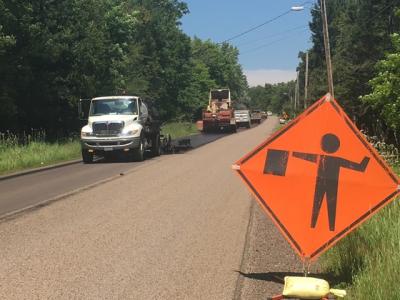
NOTICE
Roadwork/Chip Sealing
Dear Chiloquin Resident,
We are reaching out to advise you that the Klamath County Public Works has been scheduled to do application of Chip Sealing for the following roadways;
Monday, July 17, 2023 (Chip Sealing)
Second Avenue (Starting by the Chiloquin Elementary School down to Yahooskin Street)
First Avenue (all of the downtown area of First Avenue)
E Schonchin Street and E Yahooskin Street between First and Second Avenues
Tuesday and Wednesday, July 18 and 19 (Sweeping)
Beginning early morning on Tuesday and Wednesday they will be sweeping up any loose materials on the above roadways.
Please Ensure: That no cars are left in the roadway between the hours of 6:30am and 5:00pm, as this work cannot be completed in sections, and that your irrigation system does not spray into the roadway, as this will cause the chip seal to fail prematurely. Vehicles need to be parked away from asphalt edge greater than 8 feet. Vehicles parked closer may incur damage.
Expectations: Upon completion, there will be some light dust and loose stone. Highway Division crews will return to sweep loose stone after application, and will continue on an “as needed basis” after that.
For additional information call us or visit our website at cityofchiloquin.org, City Hall/Public Works tab. Thank you.
COMMONLY ASKED QUESTIONS
Why are you using chip seal on my road and not just paving it?
Rubber chip sealing was chosen because it is a proven cost-effective maintenance process that will extend the life of your road 8-10 years. For the past 8 years this process has been successfully used on many roads. Without this process we would be leaving the road vulnerable to accelerated deterioration that standard crack sealing and/or overlays would not address. Paving is not as flexible as chip sealing. When paving over roads with cracks, the cracks will reflect through the new pavement, allowing water to infiltrate the base. So, other than a smooth aesthetically pleasing surface, paving does not address the cracking. Paving also requires: that all manholes, water gates and catch basins be adjusted (at a substantial cost), driveways will need to be worked on and, if the road has curbing, losing height.
How is chip seal applied?
Chip Sealing is a process that involves spraying liquid, made up of 80% asphalt and 20% crumb rubber, at about 350+ degrees F, onto the surface of the roadway. The liquid penetrates and seals smaller cracks and joints in the pavement, while the larger cracks and joints are usually filled before this process begins. The hot liquid softens the pavement to allow the stone chips to be compacted into the road surface, both protecting the liquid and providing a new wearing surface. The rubber content stabilizes the liquid asphalt in hot weather and allows it to move with frost in the winter. In many ways this process is like having your driveway hot sealed, but we need to cover the sealer to allow for traffic as soon as possible.
What should I expect to see during the process?
This process moves quickly. The crew will arrive on the job and cover all manholes, catch basins and water gates with tar paper and stone in order to protect them so they are not covered over. The liquid applicator vehicle will then drive down the road, spraying the hot liquid asphalt, directly followed by a stone chip applicator vehicle that drops stone covering the liquid. The stones are immediately compacted into the surface of the road. The last vehicle is a street sweeper, sweeping up the loose stone chips.
What should I expect after the work is complete?
The road surface will be rough for the first 12-18 months, depending on when the work is completed and the volume of traffic on the road. Traffic and heat will set the stone and smooth the surface out. During this time period expect to see a street sweeper removing stone that will loosen up with heavier vehicle traffic (like trash and recycling trucks), this is especially noticeable on corners and in cul-de-sacs. Most roads will experience additional stones that will loosen as a result of snow plowing. These stones will be thrown into yards and driveways.
Can children play in the roadway?
The main complaint received from residents is regarding the roadway surface being too rough for children to play (riding bikes and scooters) and fear if they fall they will be injured. We advise parents to use their best judgment where their children play and if the roadway is too rough, perhaps another location would be better suited for play.
